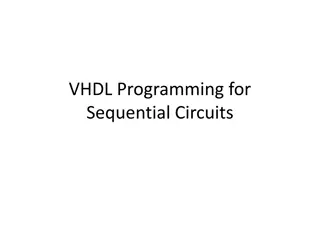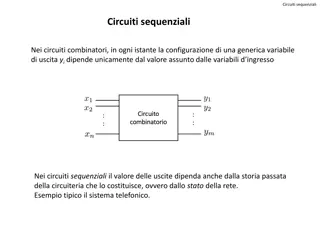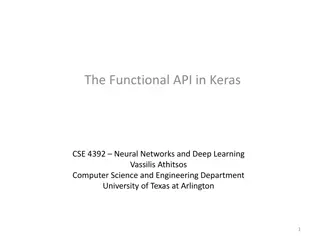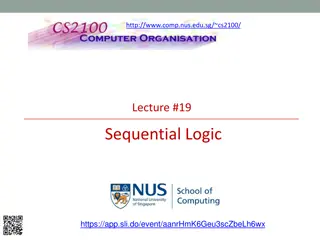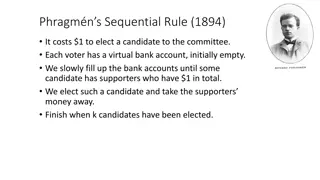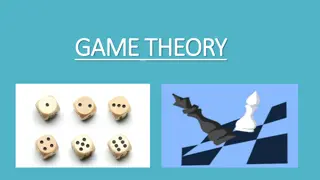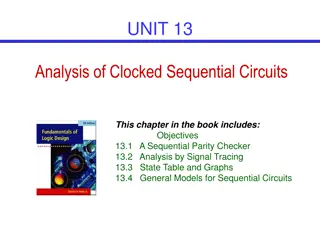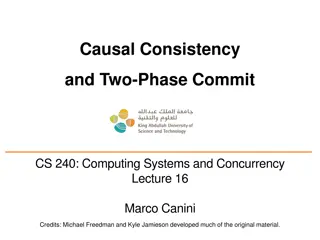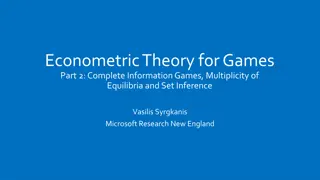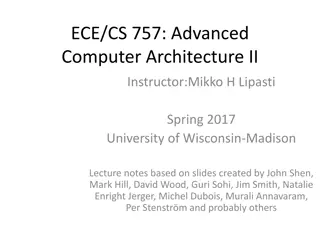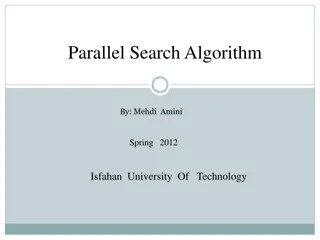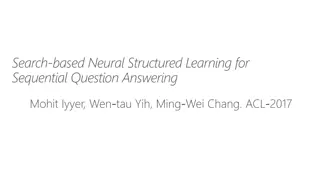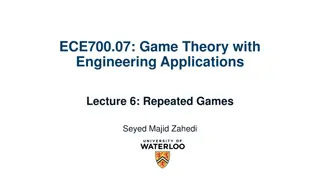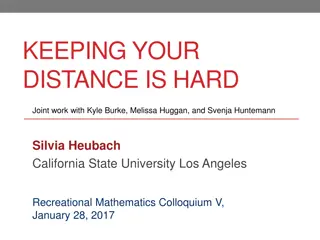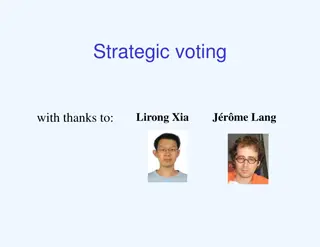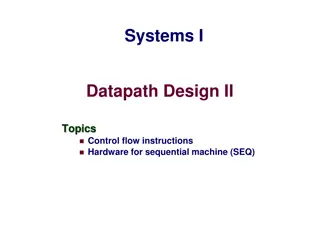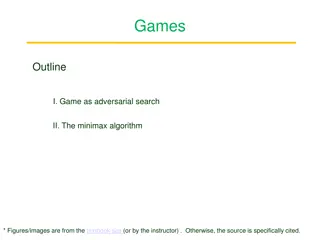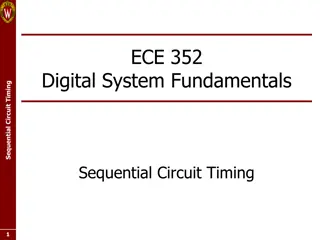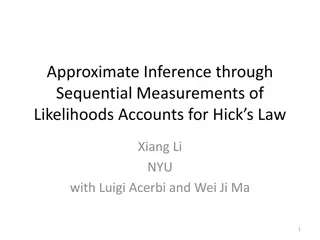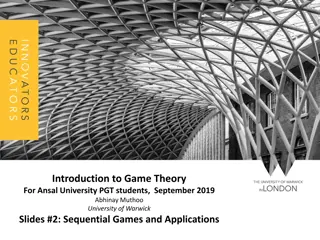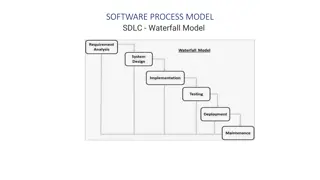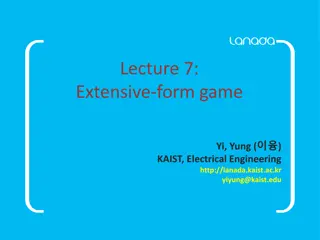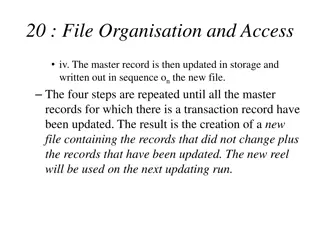Introduction to Econometric Theory for Games in Economic Analysis
This material delves into the fundamentals of econometric theory for games, focusing on estimation in static and dynamic games of incomplete information, as well as discrete static games of complete information, auction games, and algorithmic game theory. It covers basic tools, terminology, and main
8 views • 31 slides
VHDL Programming for Sequential Circuits
Explore VHDL programming for sequential circuits including SR Latch, D Latch, SR Flip Flop, JK Flip Flop, and D Flip Flop. Each code snippet is provided along with its corresponding logic and description. Gain insights into designing sequential circuits using VHDL.
13 views • 7 slides
Understanding Sequential Circuits: A Brief Overview
Sequential circuits differ from combinational circuits in that the output depends not just on the current input but also on the circuit's past history. This overview covers the basics of sequential circuits, including finite-state automata, states, transitions, and memory elements like flip-flops.
2 views • 50 slides
Understanding Sequential Logic Circuits in Digital Systems
Logic circuits in digital systems can be either combinational or sequential. Sequential circuits utilize storage elements along with logic gates, where outputs depend not only on present inputs but also on past inputs and internal states. They are essential building blocks, with storage registers pl
5 views • 20 slides
Sequential Label Price Labels Manufacturer In Kolkata India
Sequential numbering labels and related machines are utilized by large garment exporters so as to mark the numbers on the fabric in order to avoid confusion regarding color variation down the stitching line. Hence, we have established our self to deliver labels for different fabrics and varieties wi
1 views • 3 slides
Understanding Keras Functional API for Neural Networks
Explore the Keras Functional API for building complex neural network models that go beyond sequential structures. Learn how to create computational graphs, handle non-sequential models, and understand the directed graph of computations involved in deep learning. Discover the flexibility and power of
1 views • 12 slides
Understanding Sequential Logic in NUS CS2100 Lecture #19
Explore the concepts of sequential logic in Lecture #19 by Aaron Tan at NUS, covering memory elements, latches, flip-flops, asynchronous inputs, synchronous sequential circuits, and different types of sequential circuits. Delve into the distinction between combinatorial and sequential circuits, memo
3 views • 26 slides
Phragmns Sequential Rule 1894 - Election Process Explained
Phragmns Sequential Rule, introduced in 1894, outlines the process of electing committee candidates by filling voters' virtual bank accounts until a candidate garners $1 in total support. This continues until a set number of candidates have been elected. The rule dictates the cost and method of elec
0 views • 13 slides
Understanding Parallel and Distributed Computing Systems
In parallel computing, processing elements collaborate to solve problems, while distributed systems appear as a single coherent system to users, made up of independent computers. Contemporary computing systems like mobile devices, IoT devices, and high-end gaming computers incorporate parallel and d
1 views • 11 slides
Understanding Game Theory: A Strategic Framework for Decision Making
Game theory is a theoretical framework that analyzes social situations involving competing players. It helps predict outcomes in scenarios like pricing competition and product releases. Key elements include players, payoff, strategies, and optimal decisions. Game theory involves various types of gam
1 views • 15 slides
Understanding Counters in Sequential Circuits
Counters in sequential circuits are crucial components used for counting clock cycles and measuring time intervals. They are composed of flip-flops that progress through a sequence of states based on clock pulses. This sequential circuit has no inputs other than the clock pulse and relies on its int
1 views • 22 slides
Analysis of Clocked Sequential Circuits and Parity Checkers
This chapter delves into the analysis of clocked sequential circuits, focusing on topics such as sequential parity checkers, signal tracing, state tables and graphs, and models for sequential circuits. It covers concepts like Mealy and Moore machines, state equations, state graphs, timing charts, an
0 views • 38 slides
Understanding Sequential Counters in Digital Circuits
Sequential counters, comprised of flip-flops, are essential in digital circuits for counting clock cycles. They advance through states based on clock pulses and can measure time intervals. The circuit's output state solely depends on its present state, with transitions occurring at each clock pulse.
0 views • 22 slides
Understanding Causal Consistency in Distributed Systems
This content covers the concept of causal consistency in computing systems, exploring consistency models such as Causal Linearizability and Eventual Sequential. It explains the importance of logical clocks like Lamport and vector clocks, and how they ensure order in distributed systems. The concept
0 views • 35 slides
Econometric Theory for Games: Complete Information, Equilibria, and Set Inference
This tutorial series discusses econometric theory for games, covering estimation in static games, Markovian dynamic games, complete information games, auction games, algorithmic game theory, and mechanism design. It explores topics like multiplicity of equilibria, set inference, and mechanism design
1 views • 23 slides
Understanding Shift Registers in Sequential Logic Circuits
Shift registers are sequential logic circuits used for storing digital data. They consist of interconnected flip-flops that shift data in a controlled manner. This article explores different types of shift registers such as Serial In - Serial Out, Serial In - Parallel Out, Parallel In - Serial Out,
2 views • 9 slides
Exploring Limited Randomness in Repeated Games
Dive into the world of randomness in repeated games through this insightful research by Moni Naor, Pavel Hubæk, and Jon Ullman. Discover the significance of randomness in algorithms, equilibria, and finitely repeated games. Explore the necessity of randomness in Nash Equilibrium and the computation
2 views • 28 slides
Memory Consistency Models and Sequential Consistency in Computer Architecture
Memory consistency models play a crucial role in ensuring proper synchronization and ordering of memory references in computer systems. Sequential consistency, introduced by Lamport in 1979, treats processors as interleaved processes on a shared CPU and requires all references to fit into a global o
1 views • 64 slides
Sequential Search with Offer Freezing: Theory and Experimental Evidence
This paper explores the concept of offer freezing in sequential search scenarios, particularly in the context of airline ticket pricing. A theoretical model is constructed to analyze the implications of price freezing options, followed by an experimental evaluation of the model's predictions. The st
1 views • 49 slides
Parallel Search Algorithm - Types and Approaches
Exploring parallel search algorithms in artificial intelligence, this study delves into various types like Sequential Depth First Search, Sequential Best First Search, and their parallel counterparts. The research outlines the process of searching for elements in initial and goal states, emphasizing
0 views • 24 slides
Dynamic Semantic Parser Approach for Sequential Question Answering
Using a Dynamic Semantic Parser approach, the research focuses on Sequential Question Answering (SQA) by structuring queries based on semantic parses of tables as single-table databases. The goal is to generate structured queries for questions by defining formal query languages and actions for trans
0 views • 23 slides
Sequential Coalescence Model in Charmed Hadron Production
Research by Pengfei Zhuang explores the sequential coalescence correlations of charmed quarks leading to hadron production in nuclear collisions. The model involves sequential production temperature determination, QGP evolution time calculation, and coalescence process, shedding light on hadronizati
0 views • 17 slides
Game Theory with Engineering Applications: Repeated Games
Delve into the intricacies of repeated games in game theory, including finitely and infinitely repeated games with and without perfect monitoring, trigger strategies, and folk theorems. Explore the concept of subgame perfect equilibrium (SPE) in finitely repeated games through examples like the Pris
0 views • 27 slides
Understanding Video Games as Learning Tools and Art Forms
Video games serve as both learning tools and forms of art, with CyberGames being a prominent example. They incorporate interactive elements and various genres like action-adventure games. The evolution of video game consoles and the distinction between video games and Cyber games are explored, along
0 views • 12 slides
Sequential Decision Analytics Framework Overview
This content discusses a unified framework for sequential decision analytics presented at Olin Business School, University of Washington. Topics include guidelines for choosing policies, policy function approximations, cost function approximations, value function approximations, and direct lookahead
0 views • 11 slides
Deciphering Combinatorial Games Through Mathematical Analysis
Discover the intricacies of combinatorial games by analyzing strategies for winning and understanding the dynamics of distance games on graphs. Learn about known distance games like COL, SNORT, and NODEKAYLES, and explore techniques such as strategy stealing and mirroring to determine optimal gamepl
0 views • 22 slides
Parent Resource Stay at Home Games - Tyrone GAA Coaching & Games
With children at home due to the ongoing crisis, the Coaching and Games staff of Tyrone GAA have developed resources for parents to engage their kids in football skills practice. The resources include games suitable for various age groups with coaching points to ensure effective learning. New games
0 views • 17 slides
Introduction to Sequential Pattern Mining Overview
Discover the concept of sequential pattern mining, a popular data mining task introduced in 1994, with a focus on analyzing discrete sequences to find interesting patterns. Sequential pattern mining involves finding frequent subsequences in sets of discrete sequences, such as items purchased by cust
1 views • 24 slides
Understanding Sequential Rule Mining Concepts
Explore the fundamentals of sequential rule mining including discrete sequences, itemsets, and sequence databases. Learn how algorithms are used to discover interesting patterns in sequences, with examples illustrating the process.
0 views • 35 slides
Strategic Voting in Sequential Voting Games
Strategic voting in sequential voting games involves voters strategically casting their votes based on information about previous voters' preferences. Various voting rules like Plurality Rule and Borda Rule can result in different outcomes, and the concept of Nash equilibrium is explored. The settin
1 views • 32 slides
Sequential Machine Datapath Control Flow Design
Explore the hardware implementation of control flow instructions for a sequential machine, including executing jumps, calls, and returns. Dive into the stages of computation involved in handling branching, fetching instructions, updating program counters, and managing stack pointers.
0 views • 35 slides
Sequentializing Concurrent Programs for Efficient Analysis
This talk discusses the use of verification tools meant for sequential programs to analyze concurrent programs. It explores the idea of simulating concurrent programs using sequential programs and highlights the efficiency of various solutions developed for sequential programs. The talk also delves
0 views • 23 slides
Exploring Children's Hand Games Across Cultures
Discover the richness of children's hand games played by Jennifer He, Wendy Kangethe, Bryan Manzi, and Catalina Garcia. This project aims to unify folklore elements by collecting and analyzing hand games from around the world. Various games from different continents showcase similarities, difference
0 views • 20 slides
Exploring Adversarial Search and Minimax Algorithm in Games
Competitive games create conflict between agents, leading to adversarial search problems. The Minimax algorithm, used to optimize player decisions, plays a key role in analyzing strategies. Studying games offers insights into multiagent environments, economic models, and intellectual engagement. The
0 views • 17 slides
Understanding Sequential Circuit Timing and Clock Frequency
Sequential circuit timing is crucial for designing digital systems. The minimum clock period, slack values, clock frequency, and critical paths play key roles in determining the operational speed and performance of sequential circuits. By analyzing flip-flop timing parameters, combinatorial logic de
0 views • 20 slides
Sequential Approximate Inference with Limited Resolution Measurements
Delve into the world of sequential approximate inference through sequential measurements of likelihoods, accounting for Hick's Law. Explore optimal inference strategies implemented by Bayes rule and tackle the challenges of limited resolution measurements. Discover the central question of refining a
0 views • 29 slides
Understanding Sequential Games in Game Theory
Explore the concept of sequential games in game theory through an entry deterrence game involving an incumbent monopolist and a potential entrant. The game tree depicts various outcomes based on choices made by players, leading to discussions on Nash Equilibrium, credible commitments, and backward i
0 views • 17 slides
Understanding the Waterfall Model in Software Development
The Waterfall Model is a linear-sequential life cycle model for software development. In this model, each phase must be completed before the next can begin, without overlaps. The sequential phases include Requirement Gathering, System Design, Implementation, Integration and Testing, Deployment, and
0 views • 7 slides
Understanding Sequential Games in Extensive Form
Exploring the concept of sequential games through extensive-form game theory, this lecture covers game trees, player strategies, perfect/imperfect information, and the role of decision-making order. The examples illustrate how players make strategic choices based on available information, leading to
0 views • 18 slides
Sequential File Maintenance and Organisation Process
In sequential file maintenance, the master records are updated and written to a new file in sequence after processing transaction records. This process continues until all relevant master records are updated, resulting in a new file with unchanged and updated records. Additional steps involve file s
0 views • 7 slides

